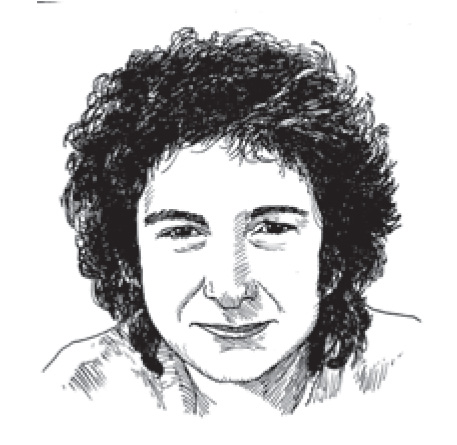At book events, the acclaimed British writer Jeanette Winterson likes to tell audiences that “we all meet at the steps of the story.” Perhaps so, but I would have preferred to encounter her as we’d planned, at Los Angeles International Airport. On the third leg of an American tour celebrating her memoir, Why Be Happy When You Could Be Normal?, her publisher had charged me with driving her around town. Having missed her at LAX, I fell into a fifty-five-minute panic, before finally tracking her to her boutique Hollywood hotel. Bounding down the steps to the front desk, Winterson greeted me with open arms and a warm smile. “It’s not your fault!” she cried. And we were off.
“If I were a rock star, this place would be great,” Winterson remarked, as we headed outside, through the hotel lobby, whose twilight lighting and voluptuous furnishings she laughingly likened to a brothel. “But I am not one.” She is, however, a literary star, having catapulted into the public imagination in 1985 with Oranges Are Not the Only Fruit, which won the Whitbread Best First Novel Award. Since then, Winterson has published seventeen more volumes of fiction, nonfiction, and children’s literature, plus two screenplays, a stage adaptation, and a large body of journalism. Her work, for which she received the Order of the British Empire in 2006, grapples with questions of identity, the mythic imagination, sexual politics, and the nature of love.
Her latest work published in the U.S., Why Be Happy, traces her journey through madness and attempted suicide, her return to health, and the promise of new love. It is also a reworking of a story she first told in Oranges—a coming-of-age drama dominated (and often terrorized) by the towering figure of her adoptive mother, Mrs. Winterson, “a flamboyant depressive” whose fondest hope, besides witnessing firsthand the Battle of Armageddon, was that her daughter would become a Pentecostal missionary.
In a sense, I think Mrs. Winterson got her wish, though not quite in the way she imagined. Jeanette Winterson has indeed grown up to be a missionary of sorts, expertly employing the skills she picked up in the revival tents of her youth. In any arena, she is a fierce and eloquent emissary for books and their power to redeem us from our darker selves, and an advocate for the joys of creativity and the primacy of the life of the mind. Winterson calls for readers to come right down to the front to be saved. “If you take anything away,” she told a rapt audience at Skylight Books in Los Feliz, “don’t live a half life.”
I watched Winterson live fully...
You have reached your article limit
Sign up for a digital subscription and continue reading all new issues, plus our entire archives, for just $1.50/month.
Already a subscriber? Sign in





